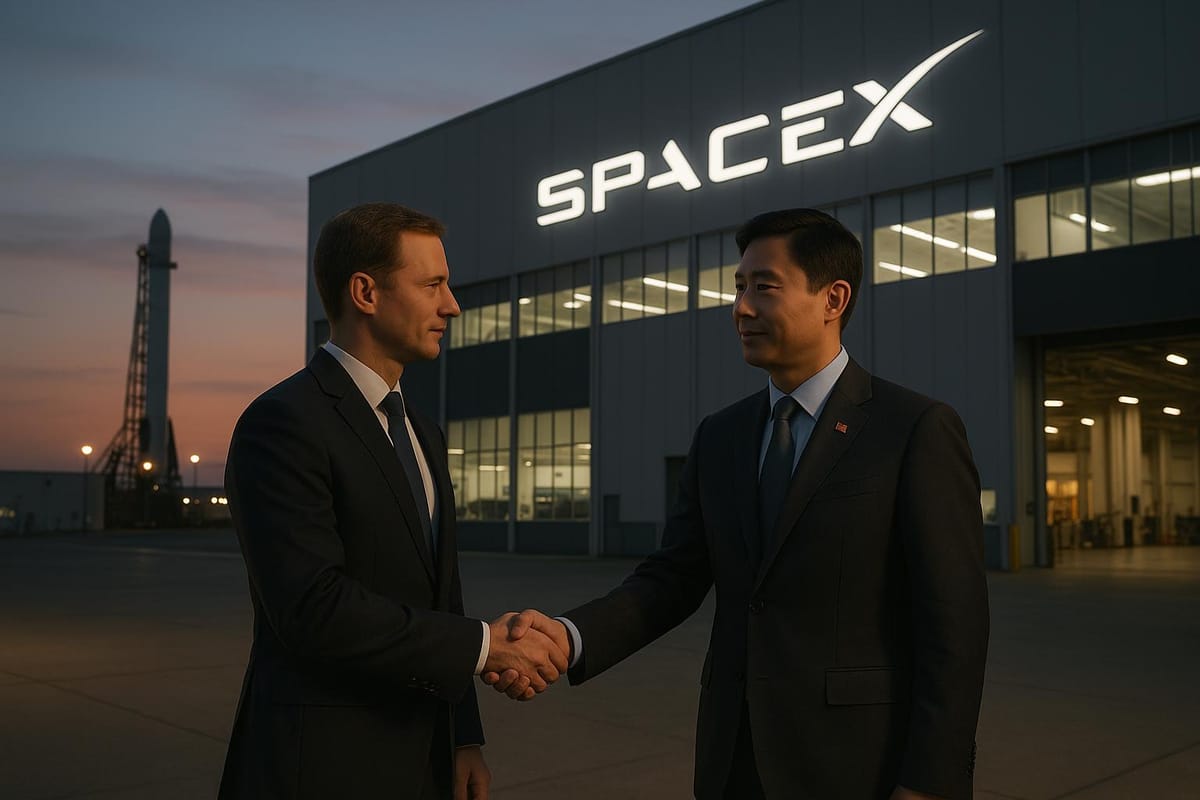SpaceX Accepts Direct Investment from Chinese Entities, Per Testimony
Unsealed testimony reveals direct Chinese investment in SpaceX, raising national security concerns.

Newly unsealed court testimony has revealed that SpaceX, one of the United States' most critical military contractors, has accepted direct investments from Chinese entities. This disclosure has sparked concerns over potential foreign ownership influence in highly sensitive U.S. industries.
The information comes from testimony given by Iqbaljit Kahlon, a key SpaceX investor, during a legal deposition last year. Kahlon stated, "They obviously have Chinese investors to be honest", and confirmed that some Chinese investors are "directly on the cap table." A company's capitalization table, or "cap table", lists all its shareholders and their respective stakes.
This marks the first time that direct investments by Chinese entities in SpaceX have been publicly disclosed. Previously, reports indicated that Chinese investors had acquired indirect stakes in SpaceX through intermediary funds. However, Kahlon's testimony points to a more direct relationship, which has raised eyebrows given SpaceX's prominent role in U.S. government projects, including building spy satellites for the Pentagon and providing internet services to U.S. embassies through its Starlink network.
Concerns Over National Security
The U.S. government closely scrutinizes foreign investments in sensitive industries, particularly those involving China. National security law experts have highlighted the risks that such investments could pose. Sarah Bauerle Danzman, a professor at Indiana University and former State Department advisor on foreign investments, explained that access to nonpublic information - such as details on SpaceX’s contracts or supply chain - could potentially be exploited for espionage. "That would create huge risks that, if realized, would have huge consequences for national security", Bauerle Danzman said.
SpaceX has not publicly disclosed the extent or specifics of Chinese investments in the company, nor the identities of the investors. The newly unsealed testimony suggests, however, that at least two direct Chinese investors were involved. While U.S. law does not outright prohibit Chinese ownership in contractors like SpaceX, such investments are heavily regulated due to the potential security implications.
A History of Investment Practices
SpaceX’s investment structure is notoriously opaque, allowing the company to control who can invest directly. Direct investors, who own actual shares, reportedly include prominent figures and funds, such as venture capitalist Peter Thiel. There is also a tier of indirect investors who buy stakes through middlemen like Kahlon, often paying significant fees. Historically, Chinese investors were known to acquire indirect stakes through middleman funds routed via offshore hubs like the Cayman Islands. However, Kahlon's testimony sheds light on direct investments.
Court records also reveal that SpaceX has no formal policy barring investments from countries considered adversarial by the U.S., such as China, Russia, or North Korea. However, Bret Johnsen, SpaceX's chief financial officer, testified that fund managers are encouraged to avoid such ownership interests as they could complicate the company’s ability to secure government contracts.
Legal Battle and Public Disclosure
The disclosure of Kahlon’s testimony comes amidst legal proceedings in Delaware, where Kahlon is embroiled in litigation with another investor. Although SpaceX fought to keep these court records sealed, ProPublica and other advocates successfully argued for their release. The judge ruled that some of the records must be made public, leading to the revelation of these direct Chinese investments.
Emails and documents from the Delaware case also indicate that Kahlon personally facilitated a $50 million investment from a Shanghai-based company in 2021. He reportedly promised investors quarterly updates on SpaceX’s business developments, visits to the company, and opportunities to interview its CFO. Though this deal was later canceled after becoming public knowledge, it highlights the complex and, at times, controversial nature of SpaceX’s fundraising practices.
Ongoing Questions
Kahlon’s testimony has intensified scrutiny of SpaceX’s financial practices and their implications for national security. In the wake of a prior investigation, House Democrats expressed concern over the company’s lack of transparency, writing a letter to Defense Secretary Pete Hegseth. They stated, "In light of the extreme sensitivity of SpaceX’s work for DoD and NASA, this lack of transparency raises serious questions."
While SpaceX has yet to respond to these revelations, the testimony raises critical issues about the balance between private enterprise and national security, particularly in industries with high stakes for U.S. defense and intelligence.
As this story unfolds, it remains unclear whether federal authorities will take further action to scrutinize or regulate SpaceX’s investment practices, especially regarding foreign ownership. For now, the newly uncovered testimony provides a rare glimpse into the financial dealings of one of the world’s most influential space technology companies.
Comments ()